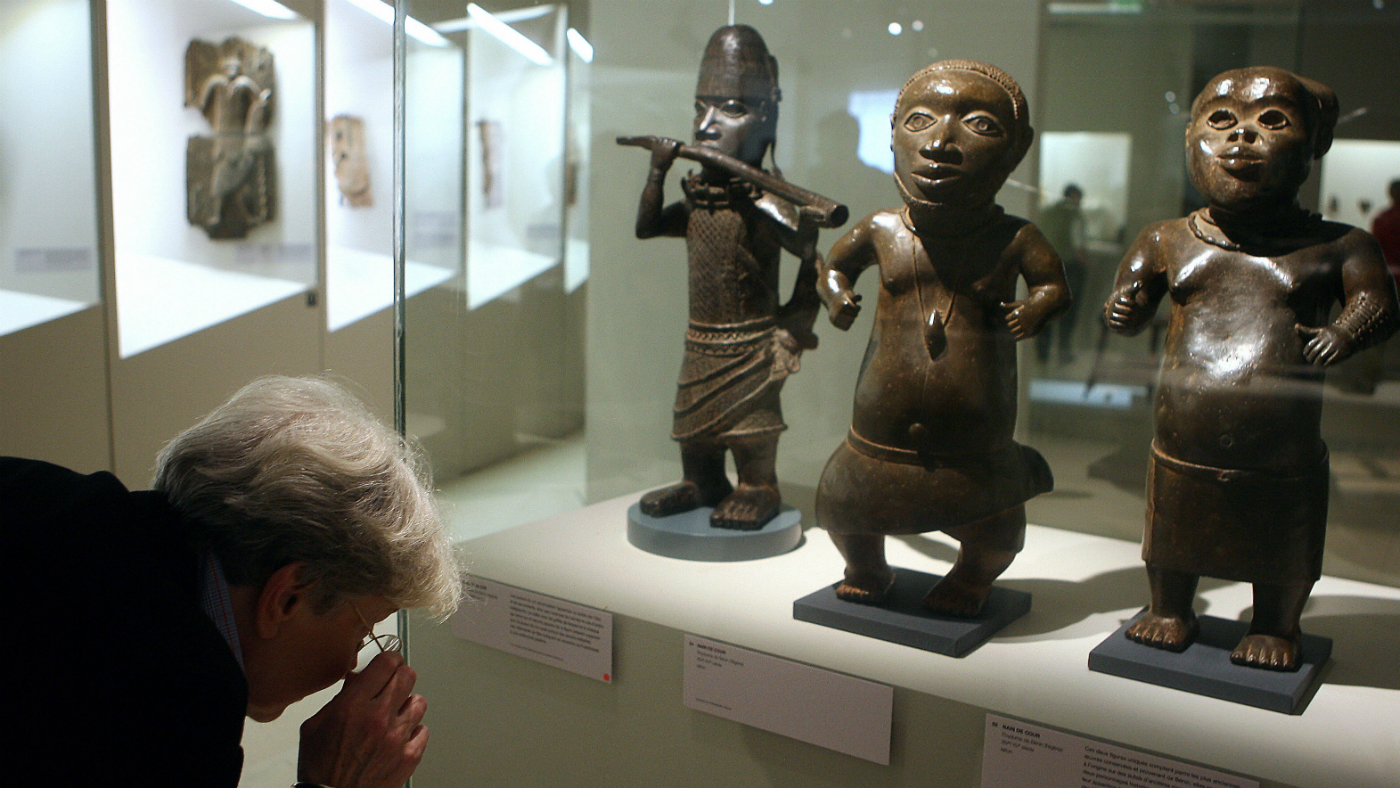France to return looted West African art
There is ‘no justification’ for artefacts to remain in French museums, says President Macron

A free daily email with the biggest news stories of the day – and the best features from TheWeek.com
You are now subscribed
Your newsletter sign-up was successful
France has agreed to return dozens of works of art to Benin more than century after they were plundered from the West African nation.
President Emmanuel Macron said 26 artefacts would be repatriated “without delay” after a report recommended the return of cultural objects stolen from Africa during the colonial era.
The items due to be returned include statues from the Palaces of Abomey taken by the French army in 1892, which are currently in the Quai Branly museum in Paris, The Local reports.
The Week
Escape your echo chamber. Get the facts behind the news, plus analysis from multiple perspectives.

Sign up for The Week's Free Newsletters
From our morning news briefing to a weekly Good News Newsletter, get the best of The Week delivered directly to your inbox.
From our morning news briefing to a weekly Good News Newsletter, get the best of The Week delivered directly to your inbox.
They represent just a handful of some 5,000 works requested by the government in Benin.
The report, written by Senegalese economist Felwine Sarr and French historian Bénédicte Savoy, concluded that unless it could be proven that African artefacts in French museums were obtained legitimately, they should be returned to the continent permanently, not on long-term loan.
President Macron has long pushed for the restitution of looted artefacts.
Speaking during a visit to Burkina Faso last year he said he “cannot accept that a large part of the cultural heritage of several African countries” is sitting in French museums and private collections.
A free daily email with the biggest news stories of the day – and the best features from TheWeek.com
“There are historical explanations for this but there is no valid, lasting and unconditional justification,” he added.
The move “marks a potential milestone in the fight by African countries to recover works pillaged by Western explorers and colonisers,” according to Reuters.
Western institutions, including the British Museum, have refused to return objects to their countries of origin – occassionally choosing to offer them on loan instead.
But some governments, such as Ethiopia and Greece, “have rejected the idea of loans, saying they should not have to borrow back their own stolen property,” Reuters adds.
-
 6 of the world’s most accessible destinations
6 of the world’s most accessible destinationsThe Week Recommends Experience all of Berlin, Singapore and Sydney
-
 How the FCC’s ‘equal time’ rule works
How the FCC’s ‘equal time’ rule worksIn the Spotlight The law is at the heart of the Colbert-CBS conflict
-
 What is the endgame in the DHS shutdown?
What is the endgame in the DHS shutdown?Today’s Big Question Democrats want to rein in ICE’s immigration crackdown
-
 Greenland’s capital becomes ground zero for the country’s diplomatic straits
Greenland’s capital becomes ground zero for the country’s diplomatic straitsIN THE SPOTLIGHT A flurry of new consular activity in Nuuk shows how important Greenland has become to Europeans’ anxiety about American imperialism
-
 Epstein files topple law CEO, roil UK government
Epstein files topple law CEO, roil UK governmentSpeed Read Peter Mandelson, Britain’s former ambassador to the US, is caught up in the scandal
-
 Iran and US prepare to meet after skirmishes
Iran and US prepare to meet after skirmishesSpeed Read The incident comes amid heightened tensions in the Middle East
-
 Israel retrieves final hostage’s body from Gaza
Israel retrieves final hostage’s body from GazaSpeed Read The 24-year-old police officer was killed during the initial Hamas attack
-
 China’s Xi targets top general in growing purge
China’s Xi targets top general in growing purgeSpeed Read Zhang Youxia is being investigated over ‘grave violations’ of the law
-
 Panama and Canada are negotiating over a crucial copper mine
Panama and Canada are negotiating over a crucial copper mineIn the Spotlight Panama is set to make a final decision on the mine this summer
-
 Why Greenland’s natural resources are nearly impossible to mine
Why Greenland’s natural resources are nearly impossible to mineThe Explainer The country’s natural landscape makes the task extremely difficult
-
 Iran cuts internet as protests escalate
Iran cuts internet as protests escalateSpeed Reada Government buildings across the country have been set on fire